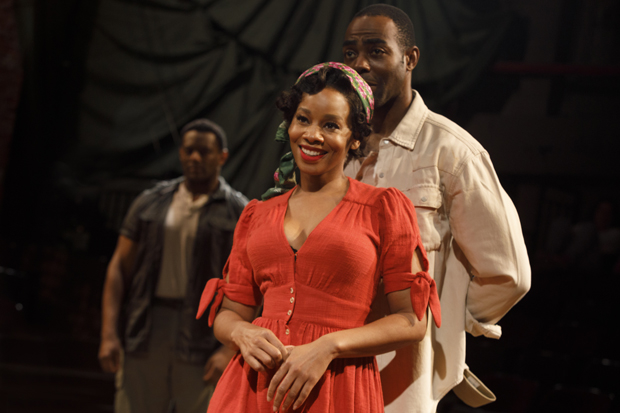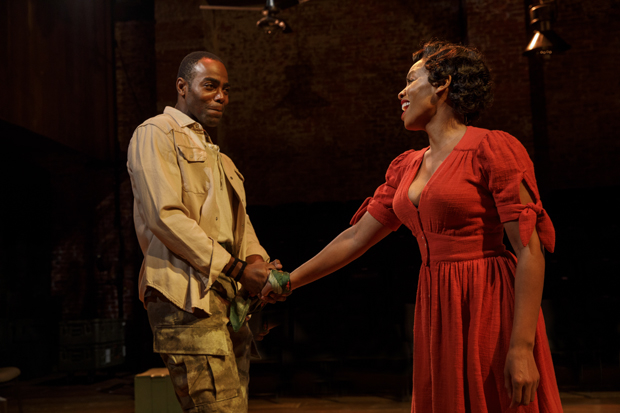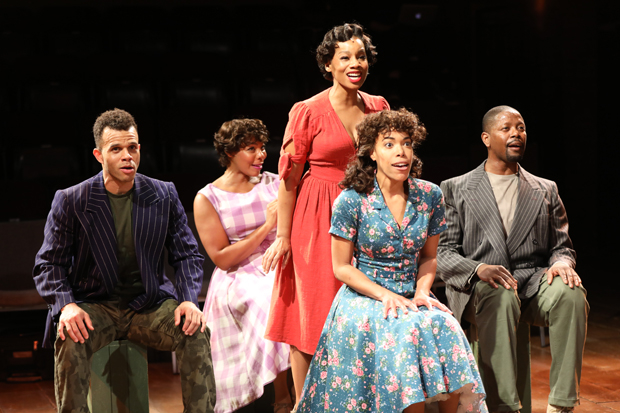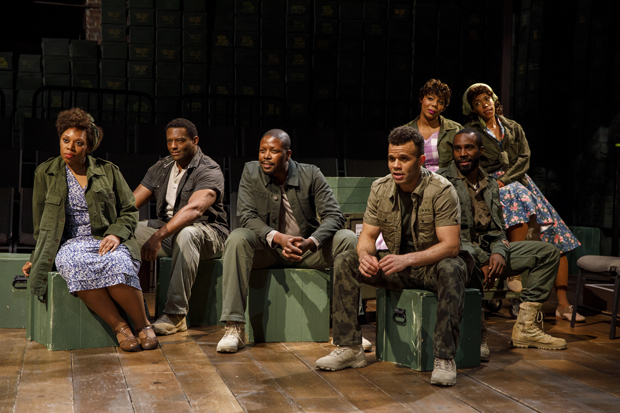Carmen Jones Delivers Opera GI-Style
Classic Stage Company revives Georges Bizet’s unwitting collaboration with Oscar Hammerstein II.

(© Joan Marcus)
Carmen is the ultimate temptress: You can tell by her red dress and matching lipstick. Beguilingly portrayed by Anika Noni Rose, she lures men into her web with her silky top notes. But there's an edge to her voice as she comes down, a poison-dipped moan that lets her victims know, "If I love you dat's de end of you." But is she really the spider woman her costume and lyrics suggest?
This is not the Carmen of Georges Bizet's perennially popular French opera, but Oscar Hammerstein's Carmen Jones, an adaptation that puts original English lyrics to Bizet's music while transposing Prosper Mérimée's story from 19th-century Spain to World War II-era America. It is now receiving a major revival at Classic Stage Company under the direction of John Doyle. A master of revelatory and efficient revivals of classic musicals, Doyle gives Carmen Jones the stripped-down treatment, forcing us to think about the porous border between romance and terror at the center of the tale.

(© Joan Marcus)
The play opens in the munitions factory where Carmen works (but mostly stirs up trouble). Cindy Lou (Lindsay Roberts) shows up looking for Joe (Clifton Duncan), the neighbor boy turned corporal she loves. But Carmen also has her eyes set on Joe, and she's determined to get him by hook or by crook. A fight in the factory leads to Carmen's brief detention and subsequent escape once she seduces Joe, who is conveniently placed on guard duty. Enchanted, Joe follows her to Billy Pastor's café and then to Chicago, where she has become the object of desire for boxer Husky Miller (the barrel-chested baritone David Aron Damane). As Joe chases Carmen, tragedy pursues close behind.
Written for an all-black cast, Carmen Jones last played Broadway in 1946 with 32 actors. The Classic Stage production features 10, all triple-threats. Foremost among them is Rose, who exudes a magnetic lust for life that makes us understand why men are drawn to her. As she slaps one of her coworkers while taunting Sergeant Brown (a silently seething Tramell Tillman) with the line "You ain't a police'm," we can't help but smile. Rose brings the kind of bad we can't get enough of.

(© Joan Marcus)
The rest of the cast rises to her high bar: Duncan easily embodies Joe's deadly anguish, as his lovesick tenor fades to something darker and more menacing. In the café scene, Soara-Joye Ross, Erica Dorfler, Justin Keyes, Lawrence E. Street, and Rose deliver a precise and perfectly harmonized quintet that wouldn't sound out of place in the best opera houses. As Carmen's friend Frankie, Ross is powerful on her top notes and luxuriously sassy throughout. She brings down the house with "Beat Out Dat Rhythm on a Drum."
The wow factor around this show is not due to a wall of sound emanating from the orchestra (Joseph Joubert has orchestrated for a band of six). Nor is it from Bill T. Jones's choreography, which mostly consists of military-style movement in formation. It's also not the result of particularly lavish design: Scott Pask's set is made of wooden crates that smartly stay out of the way; Adam Honoré's lighting emphasizes without drawing focus; Dan Moses Schreier gets the balance right for a chamber musical; and Ann Hould-Ward's army-green costumes provide for role-doubling with the addition of a simple item or two (a pinstripe suit jacket transforms Keyes from a factory worker into Husky Miller's manager).
Rather, we're taken in by the joy and enthusiasm that radiates from the cast as they seamlessly pull these elements together to tell a good story. Doyle's simple and effective staging brilliantly recalls a blueprint special, in which fighting men and women come together to entertain one another in some far-flung outpost where Bob Hope would never dare to venture.

(© Joan Marcus)
That level of can-do resourcefulness is what makes Carmen Jones both refreshing and impressive. It's the performances, however, that make it unforgettable. Rose puts the lie to Carmen's reputation as a wicked man-eater, both when she is cruel to be kind, and when she momentarily lets her hard facade crack. Her motivation is simple: She wants sex and fun on her terms, without the stewardship of a man. It shouldn't be too much to ask, but it always is when that desire comes from a woman. Most of all, Carmen Jones reveals the folly of the obsessive kind of "true love" that can only ever end in death or a restraining order. That's not romantic — it's psychotic.








